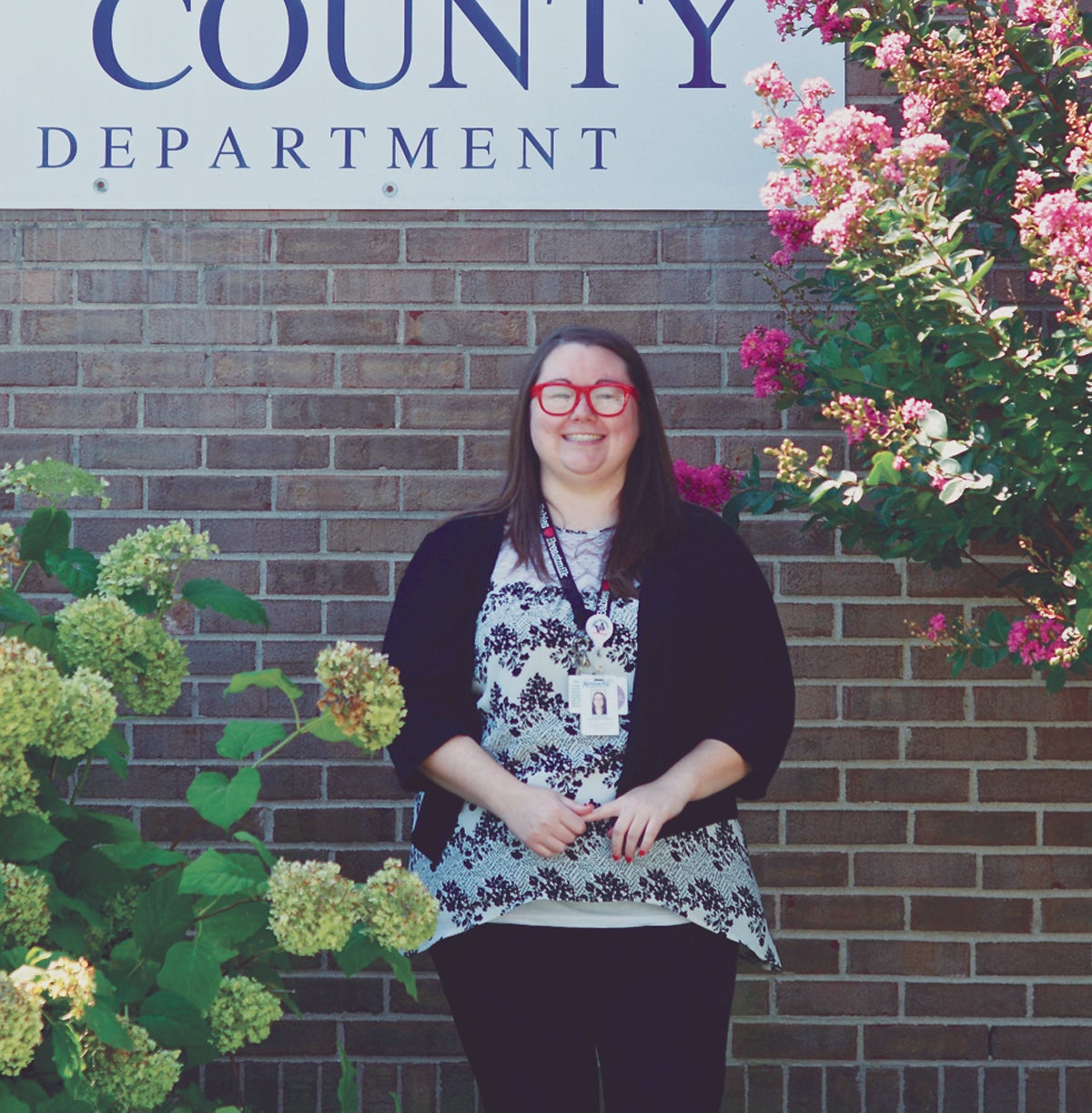Breastfeeding peer counselor supports mothers
Published 9:18 am Wednesday, August 8, 2018

- Kayla Sellers works as a breastfeeding peer counselor at the Clark County Health Department. She is teaching a free breastfeeding class at 11 a.m. on Aug. 15 downstairs at the health department. The theme for the class is "Breastfeeding: The First 6 Weeks." (Photo by Lashana Harney)
When Kayla Sellers was pregnant with her daughter about five years ago, she worked as a cake decorator.
“I wanted to be a cake decorator,” Sellers said. “I was decorating cakes when I got pregnant, and I loved it.”
But after giving birth, Sellers, a Somerset native, spent her time caring for her daughter; she was a breastfeeding mother.
“After I had my daughter, I never really thought a lot about breastfeeding,” Sellers said. “I knew I was going to do it. I never had to stop and think about it was like, duh, that’s best for my baby. That’s what I’m gonna do.”
However, Sellers experienced some struggles throughout her breastfeeding journey.
“I never realized how much moms could struggle,” she said.
Sellers said she didn’t feel like she had all the support she needed at the time. She sought help outside of Clark County, but it wasn’t good enough.
“I didn’t feel like I got the support I needed,” Sellers said.
It was gut-wrenching, Sellers said, to not have that support system.
“You’re trying all you can, but you need more help,” she said.
But her journey led her to a newfound passion: counseling breastfeeding mothers.
Sellers is now going into her fourth year as a breastfeeding peer counselor at the Clark County Health Department.
“That’s what kind of led me down here,” Sellers said. “Because for me, if you’re not truly passionate about it, you’re not going to help moms to the best of your ability. So I think that’s why I love this job so much is because I know how important it is to other moms as it was to me.”
Sellers is currently finishing her certification requirements to become an international board certified lactation consultant (IBCLC). Sellers is also working to obtain her bachelor’s degree in maternal child health through Union Institute and University.
“All I do is support breastfeeding moms,” Sellers said.
The WIC Breastfeeding Peer Counselor Program is a free program offered through the health department that provides one on one support to pregnant and breastfeeding WIC mothers.
As a peer counselor, Sellers contacts mothers during their pregnancy and assists them with any questions or concerns they may have with breastfeeding.
Sellers said she does this through mailings, phone calls and periodic visits.
After delivery, Sellers continues to provide support throughout a mother’s breastfeeding experience.
“We try to start working with them when they’re pregnant,” Sellers said. “And we work with them through their pregnancy, and then up to one year postpartum.”
Sellers also makes herself available to support mothers outside of regular business hours to answer breastfeeding questions WIC mothers may have.
“Where I work from home, my schedule is super flexible,” Sellers said. “If a mom needs me at 8:30 at night versus if you need help, typically, the only place to find lactation services is your doctor’s office or the hospital. And so even then, they’re not going to be available to you at 8:30 at night.
“So the department provides me with a cell phone that I use just for my patients that they can call or text me at. So that way, I’m available to them anytime, whenever they need.”
Sellers also teaches classes once a month. Her next class will start at 11 a.m. Wednesday, Aug. 15, downstairs at the health department’s main building on Professional Avenue. Each class has a specific topic, and the theme for next Wednesday’s class is “Breastfeeding: The First Six Weeks.”
Sellers will talk to her students about what’s expected during the first weeks of a mother’s breastfeeding journey. The class is free.
“That goes into a little bit of detail on while you’re at the hospital, what you can expect, and not just the actual breastfeeding part but just a little more of the whole aspect,” Sellers said. “Of course, every hospital is going to vary, but just a little bit of basic things like kangaroo care, or skin to skin (contact) with the baby.”
Sellers said the class is not only for mothers but also for those in a mother’s circle that could offer support such as a significant other, parent or grandparent.
“Anyone who’s going to be supporting the mom is welcome to come,” Sellers said. “And I encourage it. It’s good for them to hear the information too.”
Sellers said she also sends students home with a printout of her PowerPoint. Mothers also receive breastfeeding bags that include samples and other general information.
Sellers said she could also answer questions after the class. Classes are open to non-WIC participants whereas the peer counseling program is open exclusively for WIC participants.
Sellers said her favorite part about her job is when she sees mothers hit their breastfeeding goals.
“It’s even more exciting when that mom has struggled,” Sellers said. “Some moms, babies are born, and they have no problems. And I’m just here as moral support, ‘you’re doing great’ kind of thing.
“But then for the moms who have struggled, and I’ve met with them time and time again, and we’re teetering on ’Is this going to work? It’s not going to work.’ And then finally when everything levels out, and then they hit their goal. It’s a celebration for me too.”
Sellers said particularly recalls a time when one of her mothers who had struggled with breastfeeding in the past was determined to be successful for her last baby.
“She was like, ‘I have to do this. I have to be successful this time,’” Sellers said. “She feels like she wasn’t successful the first couple times. And so we worked very closely together. The baby nursed well, and the baby nursed well past a year old.
“I’ve had similar moments, but that particular mom, which just I felt like we had a really strong bond. And so seeing her succeed was just the best thing for me. Like, that’s the whole reason that I do this job.”
Some of the most common issues mothers experience is a perceived low milk supply.
“There’s a lot of myths around and breastfeeding, I think, but the milk supply is a big one,” Sellers said. “It’s uncommon for a mom not to be able to produce. It almost always falls back on the baby isn’t latching properly and so … they’re not getting the milk.”
Above all, Sellers said breastfeeding moms usually experience a lack of support, and that’s where she tries to step in.
It’s challenging when mothers don’t hit their breastfeeding goals.
“I’m sad for the mom,” Sellers said. “And I’m sad myself because I feel like what could I have done differently? Could I have done something differently?”
Sellers said she wasn’t prepared for the attachments and personal relationships she would develop as a peer counselor, especially coming from working as a cake decorator to working as a counselor.
Sellers said she always tries to emphasize to her mothers to seek help immediately is they are concerned, nervous or unsure about something.
“The longer you wait, what may be a teeny tiny problem can become a very large problem very quickly,” she said.
That’s why Sellers makes herself available at any time of the day.
“I’ve had moms call me at midnight,” she said. “And although that’s not required of the peer counselors, I always tell moms, if you need me, please call me. I am not going to be upset by getting woken up in the middle of the night.
“But it would bother me if a mom didn’t call me and then ended up having more problems.”
Sellers said she tries to inform people about the benefits of breastfeeding as well as clearing up any myths or misconceptions people may have heard.
Some benefits of breastfeeding include a healthier baby, a decreased risk of SIDS (Sudden Infant Death Syndrome), a reduced risk of developing chronic conditions, builds stronger bones for the baby, fewer problems with weight for both baby and mother, it incinerates calories for the mother, it’s inexpensive and creates a strong bond between mother and child.
Some common myths about breastfeeding include that babies will be spoiled because of breastfeeding; breastfeeding restricts the mother’s diet; breast size affects breastfeeding and breastfeeding issues are hereditary.
Sellers said while she recommends a healthy diet for everyone, it’s uncommon for a mother’s diet to affect the milk supply to a degree of upsetting the baby’s stomach.
Sellers said she always tries to dispel the myths and encourages all mothers to try breastfeeding or at least look into it.
Breastfeeding is on the rise. Sellers said she received a report recently that showed the number of Kentucky mothers who are exclusively breastfeeding has significantly increased as well as the duration of breastfeeding has increased.
“The vast majority of moms do initiate breastfeeding,” Sellers said. “And when we say initiate, we mean at least one time after delivery. But that rate drops drastically and very quickly. So our goal is, initially, to see what is going on between the first time and when they stop. Is it that the baby is not latching? Is it something medical? Was it something else?”
Sellers said she works with about 40-50 mothers at any given time. She said the key is to start the counseling process early.
“Those first few days, while they’re in the hospital and getting them off to that right start, is a key part in the whole breastfeeding journey,” she said. “Of course, there can be struggles after, but those first few days if moms get a strong foundation and help them throughout the breastfeeding journey. And also the longer I feel like they go as far as breastfeeding, the more likely they are to seek help.”
Sellers said she encourages mothers to join the peer counseling program or to attend the classes.
“(The health department does) try to help moms with breastfeeding, and it’s something that we care about,” Sellers said.






